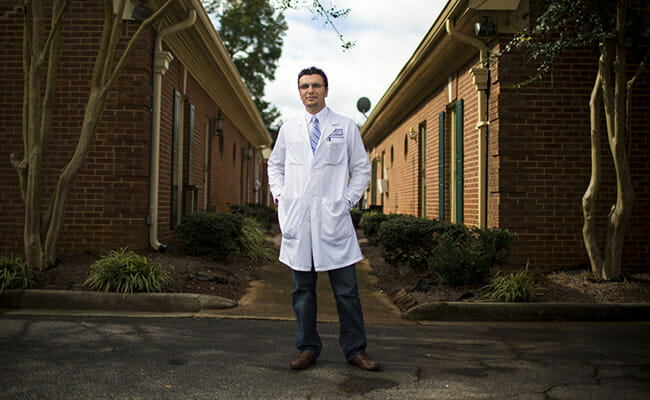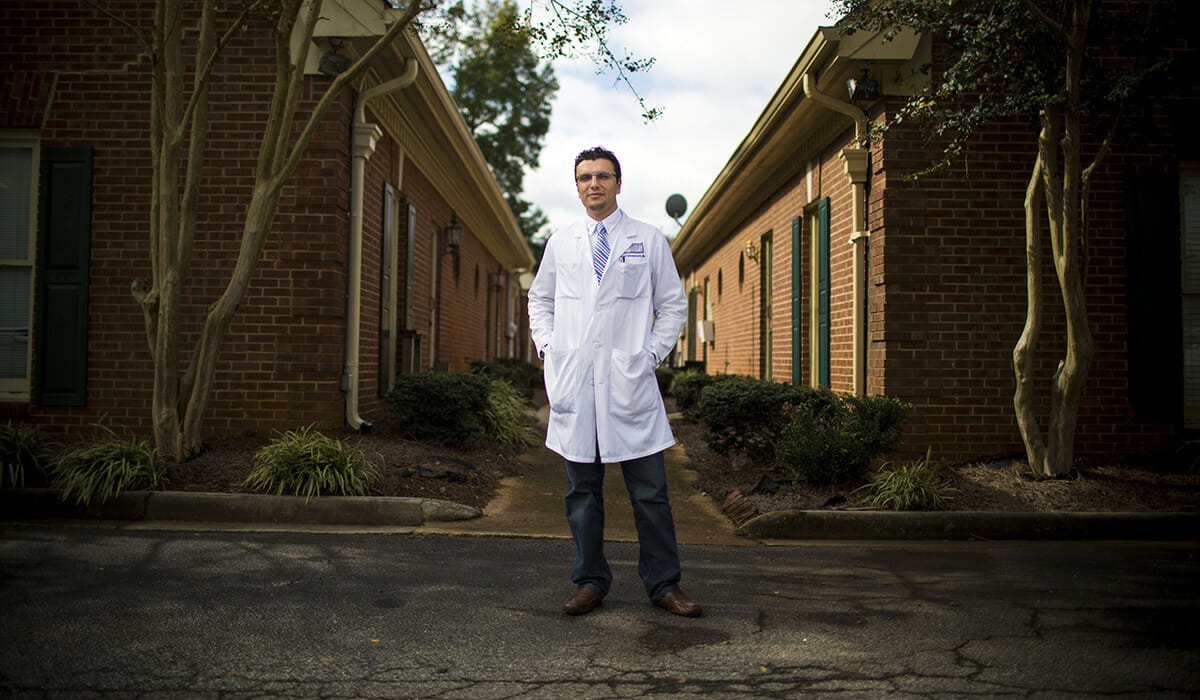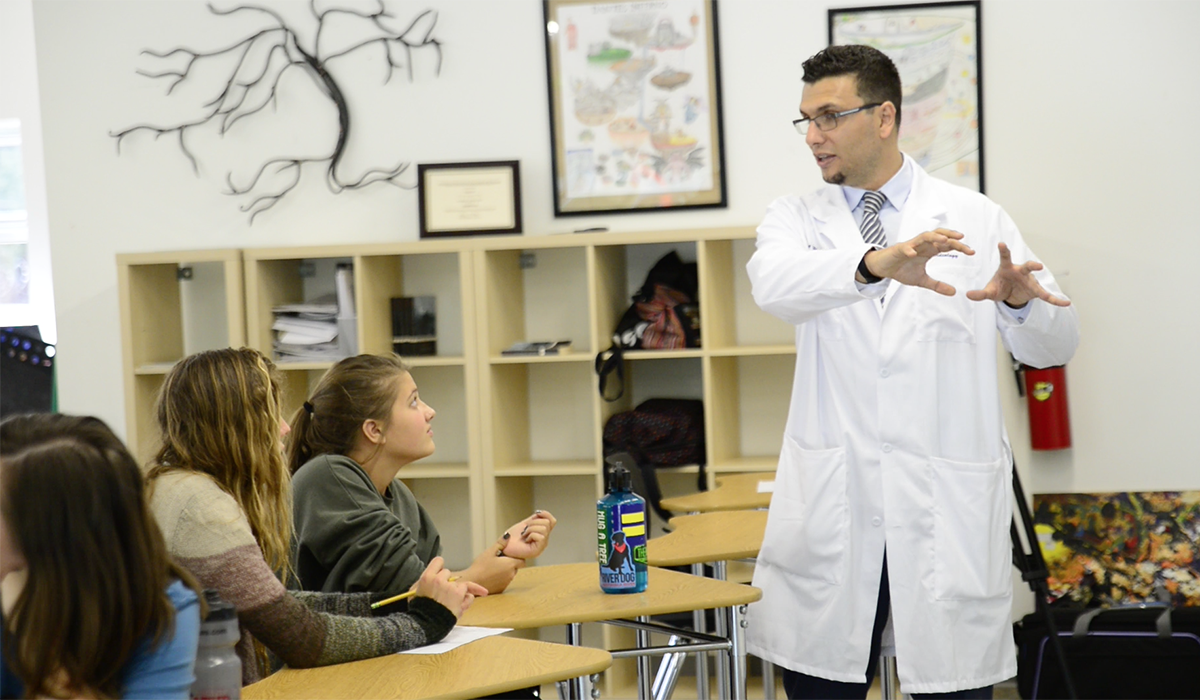Paying it Forward: Refugee Physician Invests in Youth, Giving Back to a Community That Invested in Him


Heval Kelli’s family arrived in Clarkston, Georgia, on Sept. 25, 2001 – just two weeks after the devastating 9/11 terror attacks forever changed the United States, and the world. Newly arrived refugees from Syria, the Kelli family was weary but optimistic about their future.
Having grown up in a happy, middle-class home in Aleppo, Heval’s world had been turned upside down at age 11 when his family, in fear for their safety, fled the country. They spent the next six years in Germany on asylum status, which meant that his parents could not work and although Heval excelled in school, he could not attend college. But in America, they believed their dreams could come true.
In those first days after the Kelli family arrived in Georgia, the mood of the country was tense – especially for the Muslim community. The Kellis didn’t leave their home for those first few days, until there came an unexpected knock at the door.
“I thought, at first, it was the CIA or FBI coming to get us,” Heval recalled. Instead, the Kellis found that members of the All Saints Episcopal Church had come to welcome them to their new home. They brought new clothes and furniture, and shared a meal with the family.
“It made me feel, for the first time since we left Syria, that I belonged somewhere. That I was welcome,” said Heval.
The family faced a new set of challenges in their new country. Heval’s father had heart disease and could no longer work. His mother, who did not speak English, struggled to find a job. At just 18 years old, it was up to Heval to not only finish school, but also to support his family.
He began working as a dishwasher at a Mediterranean restaurant, balancing a 40-hour work week with his full-time school schedule. He made a deal with himself that for every dish he washed, he would read one page. If he washed four hundred dishes that week, he read four hundred pages. Using this method, he quickly learned English, finished and high school and got accepted to Georgia State University – all within 10 months of coming to America as a refugee.
“Failure was not an option,” he said. “If I failed, my entire family failed.”
His determination did not go unnoticed. When Dr. Omar Lattouf heard about Heval and his desire to go to medical school, he reached out.
“I felt that someone who has such determination to never take no for an answer and to work so diligently deserves that chance,” said Dr. Lattouf, who mentored Heval throughout college and medical school.
“Mentoring him lead to great value,” he said. “That investment in him brought tremendous societal return.”
Heval is now a cardiology fellow at Emory University, just one block away from the restaurant where he spent all of those hours washing dishes.
“People like to say, you went from a dishwasher to a doctor and achieved the American Dream. And I have to correct them,” Heval said. “I didn’t achieve the American Dream – all of the people who helped me, who helped my family, did. I achieved my dream of going from dishwasher to doctor, but what makes it the American Dream is the ability to re-create the same opportunities for everyone else.”

Dr. Lattouf’s commitment and mentorship really stuck with Heval. It lead him to start the Young Physicians Initiative, a “pre-medical” mentorship program that inspires and guides students with dreams of a career in the medical field – kids just like Heval. Through after-school programming, the organization teaches high school and undergraduate students – most of whom are also refugees – about what it’s like to practice medicine and what it takes to become a doctor.
“I don’t want to be the exception. I want to be the person to inspire other kids and provide ways for them to be like me some day, and better,” said Heval. “The whole goal of this is that these minority or low-income students have someone come to their home and say, you could be like me and here is how you do it. It’s based on the concept of being present in the community and providing role models.”
In addition to YPI, Heval created the Mentoring Initiative for New Americans, which helps young refugees and immigrants pursue admission to college and medical school. He also mentors medical students, who in turn help run the Young Physicians Initiative. Through his efforts, he has built a model that fosters a community of givers. By investing invests in these students, as Dr. Lattouf invest in him, he teaches them the value of investing in others.
“Anyone I help, the rule is down the road you must invest in two other people who reach out to you for help,” he said.
Hasib Amir is one such example. The 22-year-old came to America from Afghanistan three years ago, and is already paying his investment forward.
“Dr. Kelli motivated me to work hard for my dream and never give up. He is my inspiration,” said Hasib, who is now in college with dreams of medical school. He works with Heval to help other young refugees find their path to higher education.
Heval also invests back into the community that first took him in, by volunteering his medical services for free at the Clarkston Community Health Center.
“I think it’s very important for people to understand we all have the power to make a difference in someone’s life,” he said. “When I have a weekend off, I go to the clinic for a few hours. Even these few hours a month makes a huge difference. In four hours I can see twenty patients.”
Heval believes that his success story as a Syrian refugee can be a teaching tool on its own.
“I’m a heart doctor, and I take care of you and your family,” he said. “The reason I am here is because of this great country. You invested in me. I am investing back into the community. So when you look at a refugee, maybe you can see them as an opportunity for success; an investment in our country.”
Want to make a difference in your community? Visit www.allforgood.org to find local opportunities to get involved.
